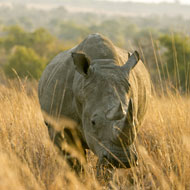Rhino horn ‘made into jewellery to evade detection’

In the past 10 years, more than 7,100 rhinos have been killed for their horns in Africa.
Rhino horn is being processed into jewellery and powder to evade detection, according to a new report by the wildlife trade monitoring network TRAFFIC.
Chinese criminal networks operating in South Africa are said to be making beads, bracelets, bangles and powder from rhino horn - ready for supply to consumers in Asia.
The report highlights recent cases in which police have uncovered small home-based workshops and seized products made from processing the horn. Previously, police typically seized whole horns, or horns cut into two or more pieces.
“The syndicates no longer want to export whole horns,” explains Colonel Johan Jooste, national commander of the Endangered Species Section in South Africa’s Directorate for Priority Crime Investigation.
“They have begun cutting them up into what they call ‘disks’ and large beads in line with demand on the market side and in order to avoid detection.”
In the past 10 years, more than 7,100 rhinos have been killed for their horns in Africa. South Africa is at the centre of the poaching crisis, and is home to the majority of Africa’s remaining rhinos. The country suffered 91 per cent of Africa’s poaching losses last year.
This crime is facilitated by resilient, adaptive criminal networks and corruption in many countries along the supply chain. Demand for rhino horn is driven by consumers in Asia, particularly Viet Nam and China.
Smugglers’ efforts to conceal rhino horn have become more sophisticated over time; horns are disguised as curios and toys, hidden in bags of cashew nuts, wine boxes and consignments of wood, or hidden in fake electronic and machine parts. To confuse the trail, traffickers use circuitous transit routes, luggage drops and exchanges.
TRAFFIC estimates that at least 2,149 rhino horns were seized between 2010 and June 2017. However, this is just a fraction of the estimated 37.04 tonnes of rhino horn, taken from the 6,661 rhinos officially reported killed by poachers in Africa between 2010 and 2016.
The discovery that rhino horn is being manufactured into products is “likely to pose significant challenges” to over-stretched law enforcement officers, according to Julian Rademeyer, a project leader with TRAFFIC.
“It is essential there are increased resources made available to implement improved detection measures and information-sharing to counteract this alarming new development,” he said.
“It is also vital that investigations do not stop at seizures of illicit wildlife products. Rather, seizures should be regarded as a first step in broader, targeted investigations focusing on the networks and key individuals facilitating the trafficking of rhino horn and other wildlife products.”



 RCVS Knowledge has welcomed Professor Peter Cockcroft as editor-in-chief for Veterinary Evidence.
RCVS Knowledge has welcomed Professor Peter Cockcroft as editor-in-chief for Veterinary Evidence.